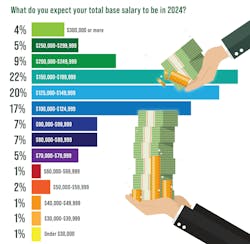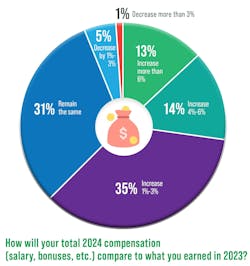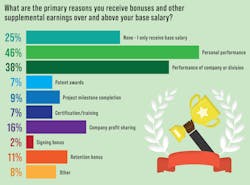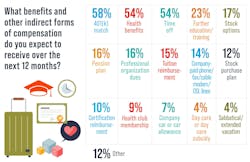Salaries Trend Up for Electrical and Electronics Engineers in 2024
Today, virtually anyone can learn how to design a circuit board or even a microprocessor. But it takes skilled engineers to design these electronic devices so that they’re not too large, too costly, or too power-hungry, while making sure that they’re unlikely to malfunction, overheat, or fail. As a result, skilled engineers today tend to be increasingly busy and, according to Electronic Design’s latest salary and career survey, expensive.
However, odds are that engineers will become even busier and more expensive as the electronics industry grapples with a steadily aging workforce and a shrinking pipeline of new talent, which are raising red flags about a looming shortage of engineers. While working harder to meet tight deadlines and stay up-to-date on the latest technological innovations, many engineers—though not all—feel confident about their future salary potential.
More than 40% of those involved in electrical and electronics engineering are landing raises in 2024, even after more than 60% earned pay increases in 2023, according to the survey, which was conducted in recent months by Electronic Design and Microwaves & RF.
In 2024, the median income of electronics engineers and other tech professionals who responded to the survey is in the range of $125,000 to $149,999. The survey revealed that slightly more than 20% of engineers expect to earn between $150,000 and $199,999, excluding bonuses, overtime pay, and other earnings over and above their base salary. In comparison, slightly less than 20% reported base salaries of over $200,000 this year.
The survey polled a sample of approximately 300 engineers from around the world—but primarily in the U.S.—at different stages of their careers with both full- and part-time roles in the electronics industry or related industries and in academia. The respondents to the survey have a wide range of technical skills, ranging from electronics to software to semiconductors to wireless and everything in between, with various responsibilities and job titles.
The results present a snapshot of a profession with a strong employment outlook. Due to the technical skills and constant training required for a career in engineering, many are seeing their stock rise in a tight labor market.
Engineering Skills: Short Supply Hits Higher Demand
Many companies are doling out higher wages to everyone from rank-and-file engineers on the front lines of the electronics industry to the managers, executives, and consultants who fill out engineering departments. But it’s not without reason.
Developing all the hard and soft skills required for a career in electrical, electronics, or wireless engineering is no easy feat. As many pointed out, it’s also no longer enough for engineers to focus on one specific arena of technical competence. Slightly more than half of respondents said that they handle tasks outside their core area of expertise, underlining the fact that they bring a broad portfolio of skills and a wide range of technical knowledge to the table.
While many engineers get a thrill out of solving technical problems, many log longer hours to stay on top of the increasingly fast pace of their jobs. They constantly struggle to find time in between deadlines to devote to continuing education. That leaves many engineers feeling overloaded, and many companies struggle to find workers with the necessary skills. Over 70% of respondents feel that the industry is lacking in engineering talent.
In practice, around 65% said that their companies have difficulty finding and hiring qualified candidates—whether in wireless, software, systems, analog, power, or various other disciplines—to fill their open engineering roles.
Many respondents lamented the lack of new engineers graduating from universities and colleges to take over for engineers who are getting ready to retire. However, they said that the situation is creating a lot of opportunities in the industry
Around 31% said that their companies are moving ahead with plans to hire more engineers or developers, undaunted by shaky conditions in the global economy. While another 61% indicated that their company plans to maintain the current level of engineering staff, many said jobs have been left vacant by retiring workers. The situation is creating opportunities for workers not only entering the field, but also those looking to find new gigs.
The generational shift taking place in the profession is also increasing competition for talent. The percentage of respondents (44%) who have worked for 30 or more years in the field is more than double the percentage (19%) with less than 10 years of experience.
The looming shortage of technical talent is most dire in the semiconductor industry. The CHIPS Act in the U.S. is driving a huge amount of new investment in chip fabs. It could create more than 160,000 job openings in engineering and technician support, along with numerous jobs for chip designers to make use of the fabs, according to research and consulting firm McKinsey. It’s unlikely that enough engineers are entering the industry to fill these roles.
Everyone, from large corporations to leading universities, is trying to rebuild the talent pipeline and investing in new ways to cultivate technical skills in the next generation of engineers and keep them in the profession for the long term.
Skilled Engineers Come Out Ahead with Higher Salaries
As companies come under more competitive pressure to innovate and struggle to find the skills they need, many engineers said they continue to see strong gains in compensation that started during the pandemic.
By and large, engineers earned pay increases in recent years that kept pace with the pandemic’s rapid price hikes. They have also had the flexibility to change jobs and switch companies more frequently in pursuit of higher pay.
Approximately one out of every four engineers said their total compensation would increase by more than 4% in 2024, signaling that many companies are raising pay rates for engineers despite uncertainty in the global economy. One out of every three anticipates a raise of between 1% and 3%. Another 31% said their total compensation would stay the same due to budget cuts and other cases of belt tightening in their organization, as well as factors such as reaching the maximum salary for their position.
While highly skilled engineers still have the leverage to negotiate bigger raises and other forms of compensation, these pay increases inevitably depend on a wide range of factors. These include their accumulated experience, higher education, geographic location, gender, title, age, and company’s overall revenue. Engineering salaries are also growing at uneven rates in different industries and for different types of technical expertise.
Some respondents in the late stages of their careers said that they’re finding it more challenging to negotiate higher salaries. Others are dissatisfied with the advancement opportunities in hard engineering roles—ones that could lead to bigger raises.
Many on-the-ground engineers feel that they must move into management, sales, or executive roles to see more significant gains in compensation. But some also said at least some companies are figuring out that engineers are not all interchangeable and they need to start paying better to lock down their top talent. About 67% of the respondents indicated that they see at least as much potential for salary growth in engineering as they did pre-pandemic.
Underlining the stability of the engineering profession, only about 5% of engineers expect a pay reduction in 2024 due to factors ranging from losing or changing jobs, leaving for other professions or for academia, or retiring from the profession.
Bonus Points: How Engineers Supplement Their Salaries
Though hiring remains their top priority, many companies are also taking steps to hold onto workers and save themselves the trouble of recruiting new hires or training engineers early in their careers, which can take a toll on productivity.
The majority of employers plan to pay out bonuses this year, supplementing base engineering salaries with a median of $2,000 to $2,999 in additional pay. However, close to 40% of the respondents anticipate between $5,000 and $10,000 in bonus pay and 20% count on more than $10,000.
What factors are used to figure out these bonuses? For the most part, engineers earn bonuses based on their personal performance (46%), while 38.5% said that their company’s overall performance comes into play. As companies compete to attract and retain scarce technical skills, around 32.5% work for companies that offer signing bonuses for new hires, and several (10%) said their companies are rolling out retention bonuses for engineers, too.
About 16% replied that their companies engage in profit sharing. It’s relatively rare for engineers to earn bonus pay for any other accomplishments—for instance, being granted a patent on a new technology—though they can contribute to future raises or performance-related bonuses.
Only around 36% of respondents said that stocks would play into their compensation package in 2024. But approximately 17%—largely working at the executive level of engineering organizations—anticipate more than $10,000 in stock awards from their company by the end of this year.
In many cases, companies are also increasing forms of indirect compensation and other perks to lure new potential hires and keep engineers from leaving for other jobs. For instance, numerous employers are putting up the money for continuing education, as the engineering shortage pushes them to nurture new skills internally. Many say they’re also being compensated for travel to industry conferences as well as training courses to keep them updated on new technologies and design techniques, which assist with long-term professional development.
Furthermore, the results revealed that most companies in the electronics industry cover the cost of healthcare for employees. In many cases, companies are also willing to match all or part of their employee’s contributions to their retirement funds.
Competition for Talent Leads to More Competitive Pay
Not everyone agrees on the current state of the profession and its prospects. Nonetheless, most engineers said that they thrive on the technical challenges of their jobs and feel that their work is impactful for their companies.
While many keep their eyes open for other opportunities that are technically challenging or pay higher salaries, 34.5% of engineers believe their compensation is equally competitive with what other employers are paying engineers with similar skills, education, and experience. Another 18% said their companies are paying better for engineers in the same job and with similar resumes, though not all the respondents are so sure.
As many as 30% of respondents feel as though they could make more money for the same job at other companies—in some cases, significantly more money than they make today. While some respondents are trying to determine whether they want to remain in engineering over the long term, most engineers said they have no intention of leaving for another profession, even if they could earn more money with their level of education and skills.
Despite all the difficulties of cultivating a career in the field, more than 90% said they encourage young people looking for diverse opportunities and strong salary potential to give electrical engineering a chance.
After all, while electronics companies and economic conditions rise and fall, the services of engineers are always needed in one form or another.
About the Author
James Morra
Senior Editor
James Morra is the senior editor for Electronic Design, covering the semiconductor industry and new technology trends, with a focus on power electronics and power management. He also reports on the business behind electrical engineering, including the electronics supply chain. He joined Electronic Design in 2015 and is based in Chicago, Illinois.






